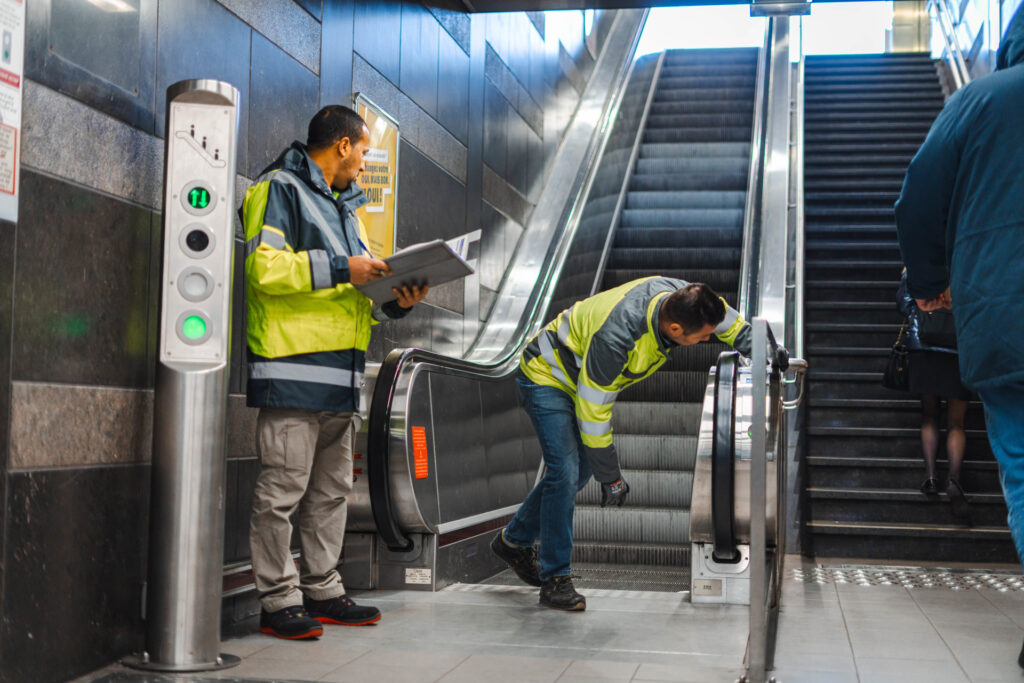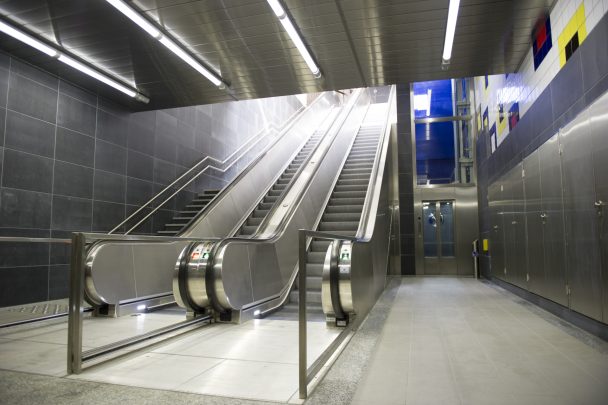“Why Isn’t This Escalator Working?” A question we often get on our social media channels. And rightly so, because escalators are essential for smooth movement across the STIB-MIVB network. In this article, we explain why some escalators are occasionally out of service, what happens behind the scenes to get them running again as quickly as possible, and how we maintain them. You’ll also find a few tips for using them safely.
Tailored maintenance for every escalator
We currently have 562 escalators on the STIB-MIVB network. These installations, first introduced in 1969, play a vital role in ensuring a smooth passenger flow through our stations, especially for passengers with reduced mobility.
Each escalator undergoes a thorough inspection. For several years now, we’ve been using a customized maintenance plan. Before, we used to have a fixed maintenance frequency (6 to 12 times a year, depending on the model), but now we’ve switched to a more dynamic approach. Today, each escalator receives maintenance tailored to its age, usage rate, and breakdown history.
90% of our escalators are now of a more recent type, equipped with an automatic restart mechanism. For example, if an object gets stuck, the escalator will attempt to restart itself once the obstruction is removed. If it fails after three attempts, a signal is automatically sent to our control centre, which immediately dispatches a technical team to the site.
Thanks to these improvements, we can manage most stopped escalators remotely, without having to send anyone on-site. Over the past 10 years, we’ve evolved from more than 100 interventions a day to about 50. A clear improvement which proves that this approach works!

Why an escalator might be out of service
We distinguish three main reasons why an escalator might be out of service:
- Technical defect: wear or a component that has reached the end of its lifespan.
- Modernization: preventive replacement of certain parts to extend the escalator’s lifespan.
- Vandalism or misuse, such as carrying heavy objects.
Depending on the type of malfunction, an escalator may be put back into service quickly or may take more time. If it’s a simple emergency stop (for example, when the emergency button was pressed), it can usually be restarted within 10 to 15 minutes. However, if a part needs to be replaced, it can take several days, depending on which component is involved.
Every action counts: proper use of escalators helps reduce breakdowns and ensures everyone’s safety. Want to avoid unpleasant surprises? Follow the safety rules!
A proper use of the escalator makes all the difference
By following a few simple rules, you contribute to everyone’s safety — and ensure a smooth, worry-free experience.
- Hold the handrail to avoid falling in case of a sudden stop.
- Take your time when stepping on or off the escalator.
- Keep pets on a leash or carry them if possible.
- Don’t use the escalator with a stroller, bike, or kick scooter — take the lift instead.
- If the escalator is out of service, use the stairs and don’t step on the escalator.
- Don’t run, play, or sit on the escalator.
- Don’t block the escalator entrance or exit: allow others to pass smoothly.

Constantly improving accessibility
Modernizing our installations, implementing smart maintenance plans, and staying vigilant every day: we do everything possible to ensure a reliable and safe journey.
But our commitment doesn’t stop there. Together with Brussels Mobility, we take every station renovation as an opportunity to improve accessibility. We install or replace additional escalators and elevators. Recent examples include Parc/Park, Gare Centrale/Centraal Station, and Porte de Namur/Naamsepoort.
And, as good information is essential, you can check the real-time status of our escalators anytime via our app. One quick glance is all it takes to travel with peace of mind.


